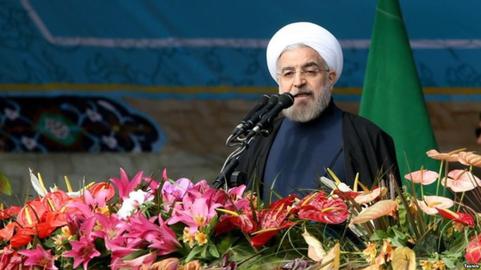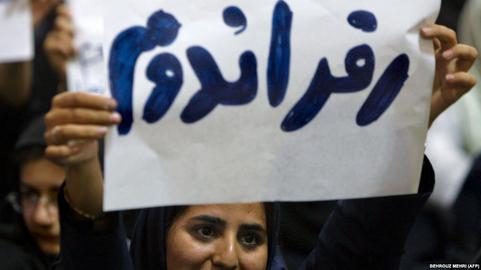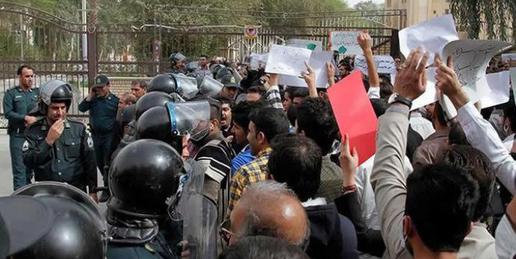A day after Iranian President Hassan Rouhani proposed a referendum to heal divisions in Iran, a group of 15 civil and political activists inside and outside Iran issued their own call for a public vote — though their approach was very different. They appealed to the United Nations to supervise a referendum to decide the future system of government in Iran, describing the Islamic Republic as “incapable of reform.”
The statement is signed by:
- Nasrin Sotoudeh, lawyer and human rights activist
- Shirin Ebadi, Noble Peace Prize laureate, lawyer and defender of human rights
- Narges Mohammadi, human rights activist
- Payam Akhavan, lawyer, professor of law and a member of the Court of Arbitration at the Hague
- Jafar Panahi, film director
- Mohsen Sazegara, Journalist and pro-democracy political activist
- Mohammad Seifzadeh, lawyer, former judge and human rights activist
- Hassan Shariatmadari, opposition politician and pro-democracy activist
- Heshmatollah Tabarzadi, journalist and pro-democracy activist
- Abolfazl Ghadyani, reformist activist
- Mohsen Kadivar, philosopher and reformist activist
- Kazem Kardavani, sociologist
- Mohsen Makhmalbaf, film director
- Mohammad Maleki, academic and pro-democracy activist
- Mohammad Nourizad, filmmaker, former journalist and human rights activist
Over the last 40 years, says the statement, not only have the pains and sufferings of the people of Iran not been lessened, they have increased because the Iranian people are forced to live a double life and because they are constantly pressured to display their religious commitment. The statement says:
“As a result of ignorance, structural inefficiency and institutionalized corruption, the authorities are unable to solve people’s ordinary, everyday problems. Discrimination, corruption and astronomical embezzlements are running amok. Many unjust laws lead to discrimination and encourage violence. And the judiciary, instead of administering justice and executing even these defective laws, is carrying out the political intentions of the rulers.”
The Main Obstacle
Pointing to the arrests of civil and social activists, the statement declares that “the regime has become the main obstacle in the way of Iranian people’s progress and liberty by hiding behind a theological shelter, abusing religion, lying, duplicity, opacity, ignoring public opinion, spurning the rule of law and the principles of human rights, institutionalized violations of freedom and the rights of the people, utter inability in solving political, economic, social and cultural crisis and closing all doors to legal oversight and peaceful reform.”
Although the signatories call for a referendum to decide the system of the government, they do have a vision, that of “a secular parliamentary democracy based on popular free elections, thorough observance of human rights and eradicating all institutionalized discriminations, especially [those standing in the way of] complete equality for women, ethnic groups and religions in all cultural, social, political and economic fields.”
It is worth considering the signatories and their current situations. Jafar Panahi, Nasrin Sotoudeh, Narges Mohammadi, Abolfazl Ghadyani, Mohammad Nourizad, Mohammad Seifzadeh, Heshmatollah Tabarzadi and Mohammad Maleki all live in Iran and have signed the statement despite the risks and the threats they face. Narges Mohammadi is currently serving a sentence at Evin Prison. The fact that Abolfazl Ghadyani, one of the best-known reformist political prisoners, signed the statement could be a sign of a political realignment in Iran.
“We Need Everyone”
In a speech on Sunday, February 11 to mark the 39th anniversary of the 1979 Islamic Revolution, President Rouhani called for unity. He said,“Today, we need everyone, including principlists, reformists, moderates and everyone who recognizes the constitution, for the country’s development and progress.”
“The constitution should be our point of reference,” he said. “If we disagree on some issues, we should refer to Article 59.”
According to Article 59 of the Iranian constitution, “in extremely important economic, political, social, and cultural matters, the function of the legislature may be exercised through direct recourse to popular vote through a referendum. Any request for such direct recourse to public opinion must be approved by two-thirds of the members of the Islamic Consultative Assembly.”
Crucially, it is parliament that has the power to call a referendum, not the president of the Islamic Republic.
Soon after Rouhani’s speech, Iran’s conservatives lost no time in attacking him. Ezzatolah Zarghami, former head of the Islamic Republic of Iran Broadcasting (IRIB), dismissed Rouhani’s proposal as “in bad taste,” and Abdollah Ganji, managing editor of the newspaper Javan, an affiliate of IRIB, criticized Rouhani, questioning whether, by proposing a referendum on the 39th anniversary of the victory of the revolution, such a high Islamic Republic official could be considered to be “politically competent.”
visit the accountability section
In this section of Iran Wire, you can contact the officials and launch your campaign for various problems


























comments